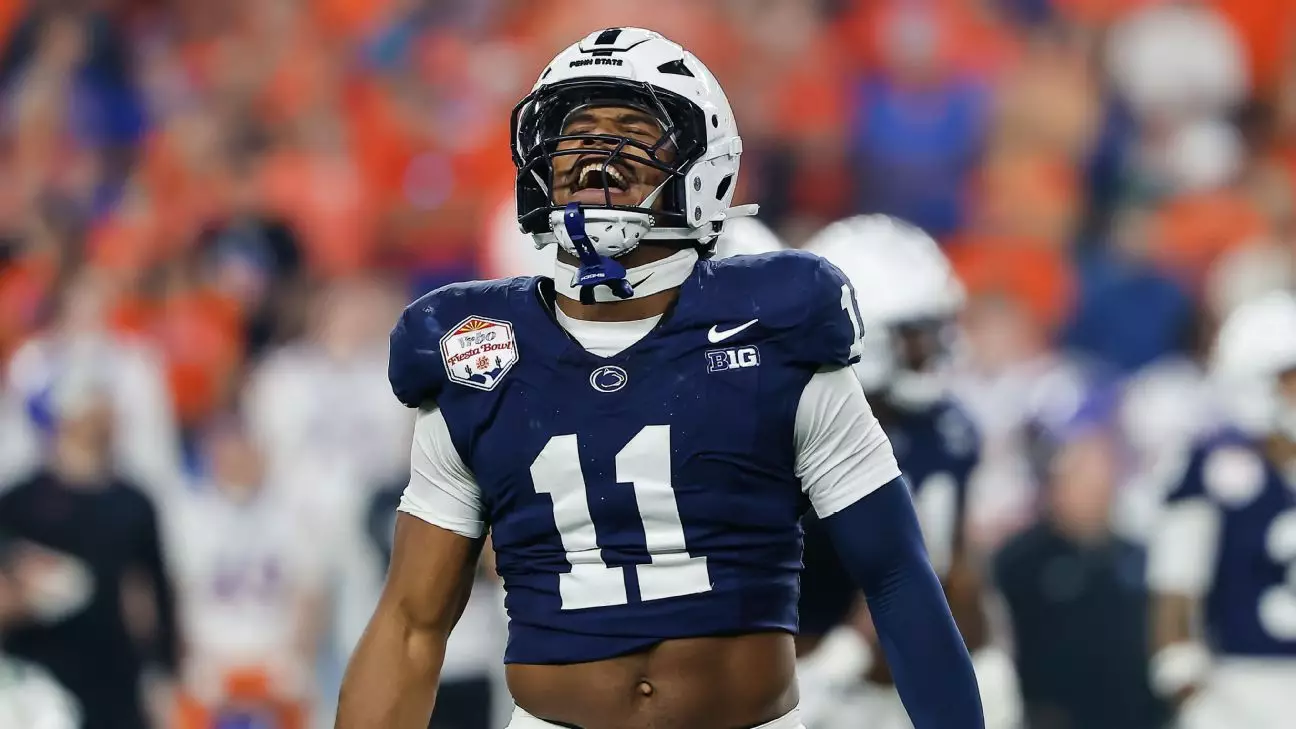With the NFL draft looming just weeks away, Abdul Carter’s advocacy for himself is resonating deeply within the football community. As the Tennessee Titans prepare to select their first overall pick, the Penn State outside linebacker is leaving no stone unturned to present himself as the premier candidate. During a recent pro day, Carter passionately articulated how his multifaceted skills could transform an NFL franchise. His assertion that he can significantly elevate the performance of those around him speaks volumes about his character and approach to the game.
What stands out in Carter’s pitch is the emphasis on “impact.” He does not just want to be a player; he aspires to be a game-changer. This perspective is not merely about individual talent but how that talent can catalyze success across the entire team. In a league where quarterback dynamics tend to dominate discussions surrounding impact players, Carter’s viewpoint serves as a refreshing reminder that defense holds monumental value. His drive can easily resonate with teams looking for that elusive edge in high-stakes situations, particularly for franchises like the Titans, who are searching for a shift in momentum.
A Complex Road to Recovery
Carter arrives at this pivotal moment in his career amid the aftermath of an arm and shoulder injury sustained during the College Football Playoff. He has understandably opted to sit out on-field exercises during his pro day, considering his long-term health over immediate performance. This decision is emblematic of a cerebral approach to a business riddled with pressure and youthful ambition. He recognizes the need to prioritize his wellbeing, insisting that recovery takes precedence. Despite this adversity, he demonstrates resilience—a quality that highlights not only his dedication but his maturity.
His decision-making reflects prudence and foresight, traits that undoubtedly will serve him well in the NFL landscape. With agents like Drew Rosenhaus backing him, it is evident that Carter is surrounded by individuals who understand the complexities of navigating pre-draft scenarios. By consciously choosing to abstain from workouts, he’s signaling that he prioritizes sustainable performance over short-term gains. Such wisdom is often overlooked by younger prospects blinded by the lights of immediate fame and recognition.
Physical Concerns and Dedication
Moreover, Carter’s journey includes confronting additional physical challenges. Diagnosed with a stress reaction in his right foot during the NFL Combine, he has dealt with this hurdle head-on, consistently reassessing his wellness. Remarkably, despite never feeling symptoms or pain, the fact that he is proactive about managing his health is telling of his professionalism. While some might view injury setbacks as detriments, Carter’s response exemplifies a commitment to preparedness and adaptability. This attitude instills confidence in prospective teams that they will be drafting not only a talented athlete but also someone with significant emotional intelligence.
His ability to project strength while addressing medical hurdles speaks volumes about his character. In a sport that often narrowly defines success in terms of physical prowess, Carter’s narrative underscores the importance of mental fortitude, both in how he deals with adversity and in his aspirations for what he can accomplish on the field.
Rethinking the Value of Defense
Carter’s candid belief in the impact of defensive players contrasts sharply with the general bias towards quarterbacks in the NFL draft narrative. His remarks frame defense not merely as a support role but as a force capable of dictating the outcomes of games—especially in crucial moments like Super Bowls. While many pundits have their eyes fixed on quarterbacks, Carter champions the notion that defensive talents like him can change the landscape of a game.
This perspective challenges the conventional wisdom while reinvigorating conversations about the significant contributions strong defensive players can deliver. With teams realizing that substantial growth often comes from robust defensive strategies, Carter’s message becomes even more salient. He is a living example of how defensive prowess can balance the scales and create an equally formidable force alongside offensive plays.
In a year where the focus is steered towards high-profile quarterbacks, Abdul Carter is poised to carve out a narrative that places defensive prowess in the spotlight for the NFL draft. Each line he utters during this pivotal moment echoes a deeper call for teams to recognize the transformational power of authentic leadership on the field, making the case that it’s time to embrace the versatility and impact that defensive players can exert in the NFL.


Leave a Reply